Former army engineer recalls how Malaysia has gone through three wars in four decades!
By Lieutenant Colonel Raymond Goh Boon Pah [former Commander Royal Engineer Regiment of 4 Infantry Division, Ingenieur] - November 28, 2021
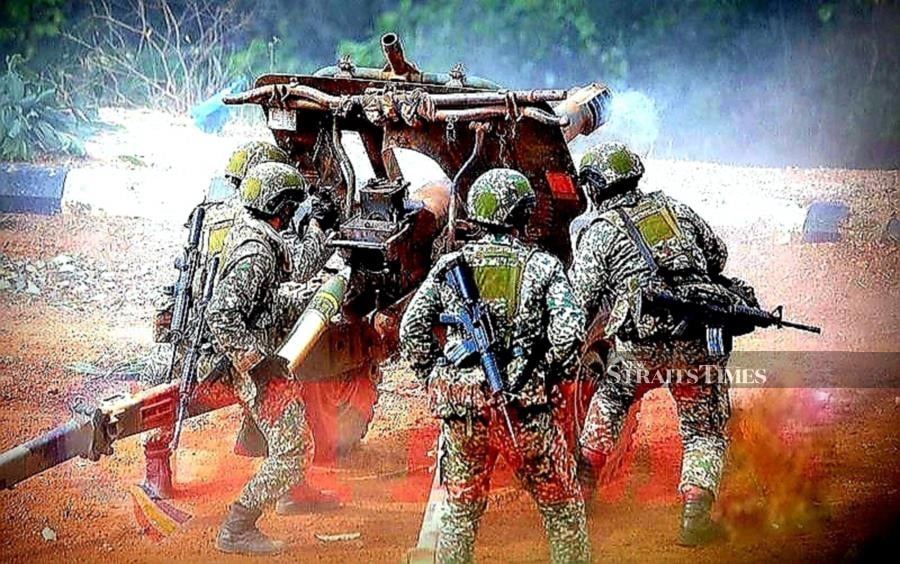
Artillery fire support at the East-West Highway.
THE Second Malayan Emergency, which took place from 1968 to 1989, was a communist insurgency in armed conflict against the sovereignty and democracy of Malaysia. This involved the rise of the Malayan Communist Party (MCP).
With the independence of Malaya declared under then-Prime Minister, Tunku Abdul Rahman, on Aug 31, 1957, the MCP's rationale of it being a war of colonial liberation against the British administration of Malaya was lost.
The last insurgency ended with their surrender in the Telok Anson district in 1958. On July 31, 1960, the Prime Minister of Malaya declared the end of emergency.
However, communist leader Chin Peng renewed the insurgency against the Malayan government in 1968. Barely had the Indonesian Confrontation (1963) ended on Aug 11, 1966, when the Second Malayan Emergency erupted.
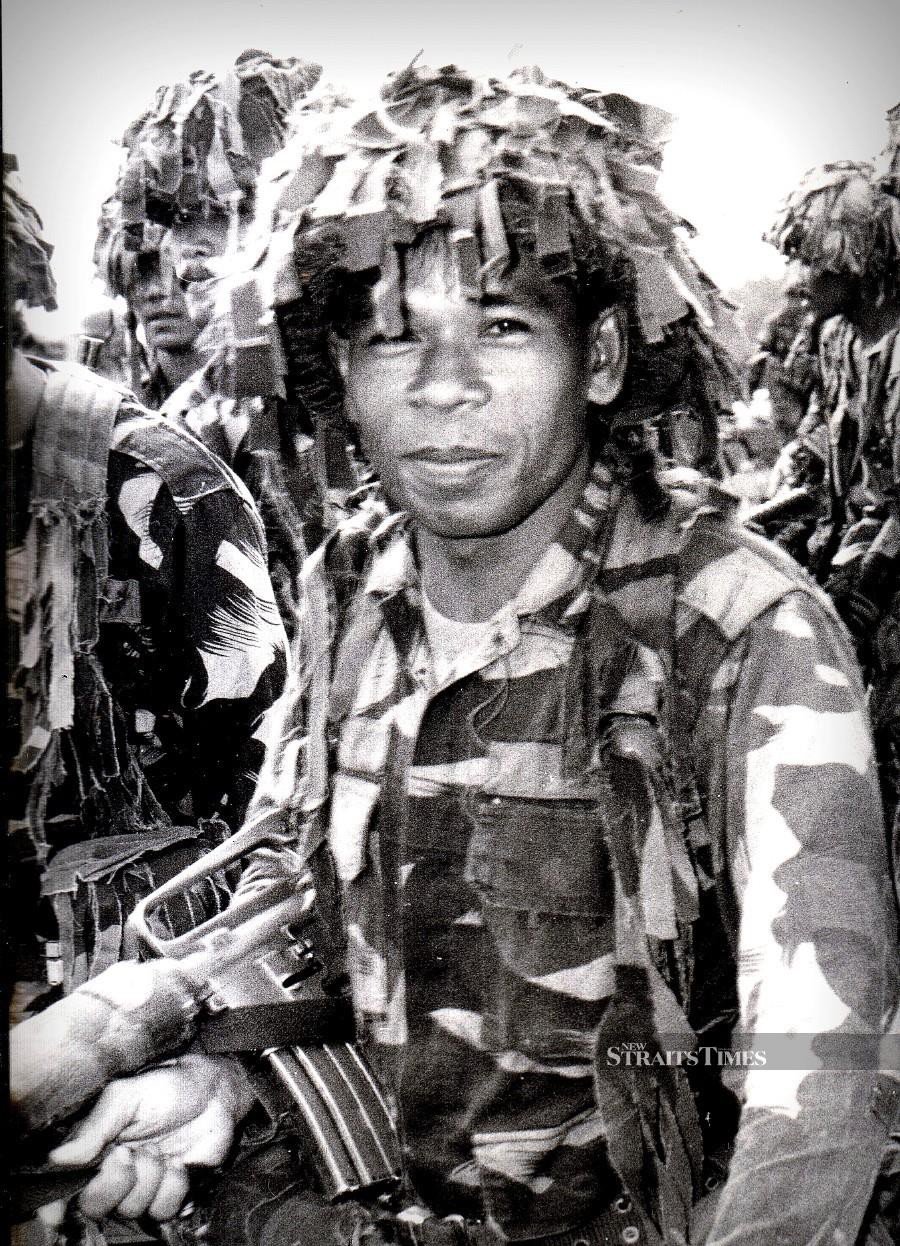
THE Second Malayan Emergency, which took place from 1968 to 1989, was a communist insurgency in armed conflict against the sovereignty and democracy of Malaysia. This involved the rise of the Malayan Communist Party (MCP).
With the independence of Malaya declared under then-Prime Minister, Tunku Abdul Rahman, on Aug 31, 1957, the MCP's rationale of it being a war of colonial liberation against the British administration of Malaya was lost.
The last insurgency ended with their surrender in the Telok Anson district in 1958. On July 31, 1960, the Prime Minister of Malaya declared the end of emergency.
However, communist leader Chin Peng renewed the insurgency against the Malayan government in 1968. Barely had the Indonesian Confrontation (1963) ended on Aug 11, 1966, when the Second Malayan Emergency erupted.

Malaysian troops in combat gear.
The second communist insurgency officially began on June 17, 1968, when they ambushed our security forces at the Kroh-Betong road in Perak. The rise of the MCP was inspired by the victory of the communists in the Vietnam War.
After World War 2, the communists in Vietnam under Uncle Ho Chi Minh's party (formed in 1930) had occupied the countryside and were inspired to fight a decisive battle against the French colonialists for their country's independence. This took place in Dien Bien Phu at the Northwestern border with Laos in May 1954.
The French garrison, with about 11,000 men in a large valley plain with a river and an airfield, was between two ranges of hills on both sides, which were the grounds of tactical importance (GTI).
In spite of the dense hilly jungle terrain, a formidable force of 260,000 civilian labour in family units improvised their logistics by towing about 200 artillery guns, mortars and ammunition using bicycles and ropes up the hills under the command of their brilliant tactician, General Giap, known as the Red Napoleon.
They also managed to bring up 27,000 tons tonnes of rice for the campaign. The jungles provided excellent camouflage and silence. Indeed, it was an extraordinary logistics feat in military history.
MASSIVE ASSAULT
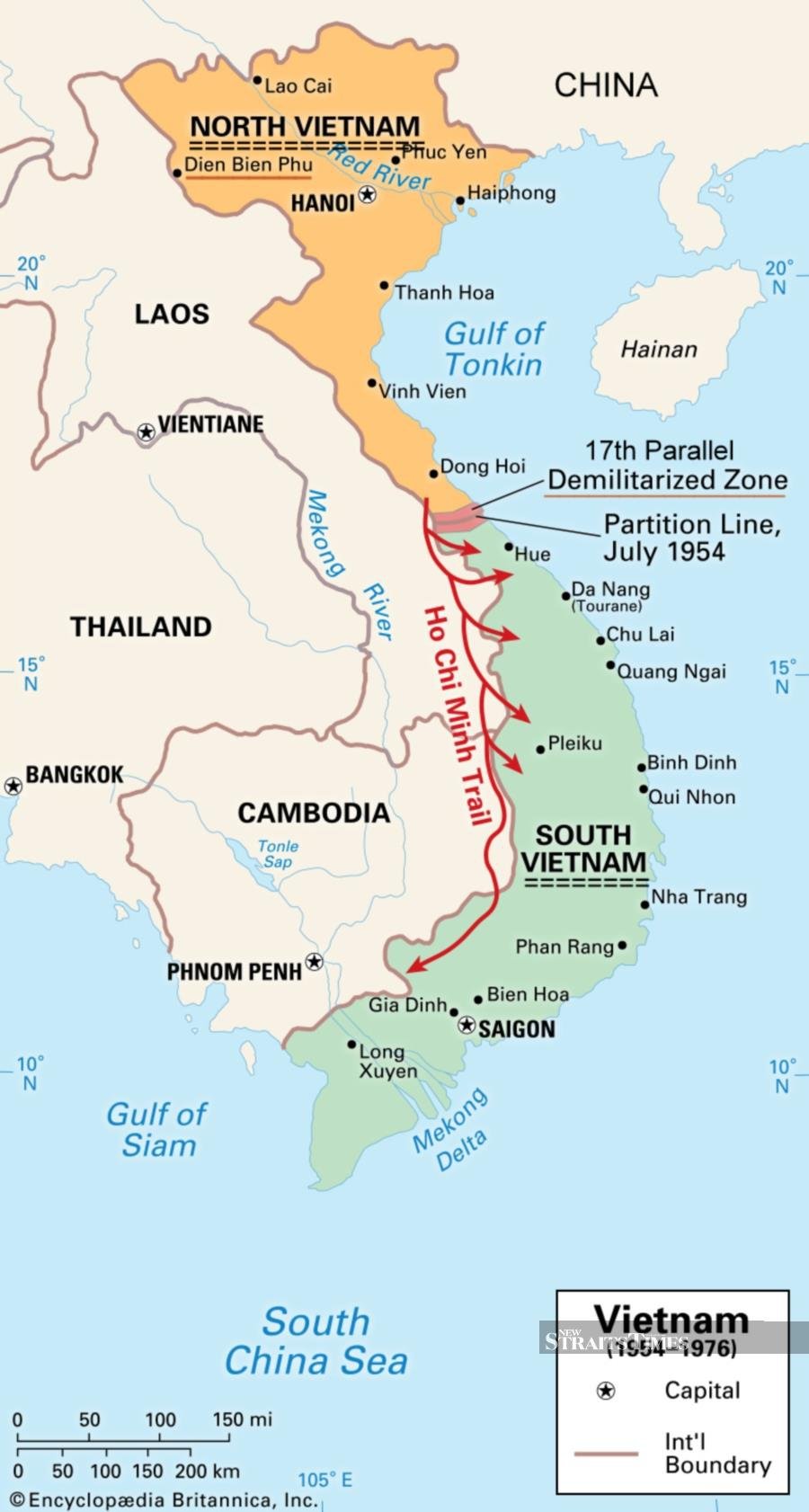
The second communist insurgency officially began on June 17, 1968, when they ambushed our security forces at the Kroh-Betong road in Perak. The rise of the MCP was inspired by the victory of the communists in the Vietnam War.
After World War 2, the communists in Vietnam under Uncle Ho Chi Minh's party (formed in 1930) had occupied the countryside and were inspired to fight a decisive battle against the French colonialists for their country's independence. This took place in Dien Bien Phu at the Northwestern border with Laos in May 1954.
The French garrison, with about 11,000 men in a large valley plain with a river and an airfield, was between two ranges of hills on both sides, which were the grounds of tactical importance (GTI).
In spite of the dense hilly jungle terrain, a formidable force of 260,000 civilian labour in family units improvised their logistics by towing about 200 artillery guns, mortars and ammunition using bicycles and ropes up the hills under the command of their brilliant tactician, General Giap, known as the Red Napoleon.
They also managed to bring up 27,000 tons tonnes of rice for the campaign. The jungles provided excellent camouflage and silence. Indeed, it was an extraordinary logistics feat in military history.
MASSIVE ASSAULT

Map of Vietnam, 1954 - 1975.
In late November 1953, the communists began their deployment around the garrison. At 5pm on March 13, 1954, they bombarded the French garrison with massive artillery and mortar fire. This was followed by assaults in two phases into the northern sector of the garrison.
They had four infantry division groups comprising 49,000 men. The final massive assault, which was carried out by new moon night on May 1, 1954, saw overwhelming human waves after waves of communist forces charging into the southern sector in tenacious attacks from their tunnels and trenches dug around the perimeter.
After six days of fighting, the communists hoisted their red flag on top of the French command bunker. The time was 5.30am, and the date, May 7, 1954. The French commander opted to surrender in order to prevent further loss of lives.
The French had 3,000 dead and 8,000 captured/wounded while the communists saw 8,000 dead and 15,000 wounded. The French prisoners were forced-marched to the prisoner of war camps in Hanoi, which was located about 470km (293 miles) away. However, almost half that number perished along the way due to diseases.
After 55 days of battle, the French Empire in Indo-China ended their 67 years of occupation. It was just arrogance, ignorance, and poor intelligence which had led to their defeat. This battle was significant for all tacticians.
At the Geneva Convention on July 21, 1954, the first Chinese Premier, Zhou Enlai, negotiated with the French Premier, Pierre Mendes, to pull out of Vietnam and forced Ho Chi Minh to agree to a partition of two states by the 17th Parallel as the De-militarised Zone (DMZ — 3 miles/4.8km either side), similar to what happened at the end of the Korean War on July 27, 1953.
Reluctantly, the communists occupied North Vietnam while the others, South Vietnam. In order to supervise this agreement, an international commission comprising Canadian, Polish and Indian members was formed under an Indian Chairman.
However, President Ho Chi Minh was dissatisfied with the agreement and was determined to unite his homeland. On Nov 1, 1955, the communists used guerrilla tactics by the Ho Chi Minh Trail, bypassing the DMZ via Laos and Cambodia.
Meanwhile, after the fall of Dien Bien Phu, profound anxiety and apprehension fell upon the Southeast Asian countries, similar to what happened in Eastern Europe which came under Russian communist rule after World War 2.
A super power propounded and expounded the Domino Theory to contain the communists from infiltrating south into Malaysia, Singapore, Indonesia and Philippines. In fact, with the French power vacuum, Laos and Cambodia came under communist rule. On Nov 1, 1955, the United States, led by President Dwight D. Eisenhower, intervened in the Vietnam War to contain communism and protect western democracy.
ROYAL ENGINEER REGIMENT
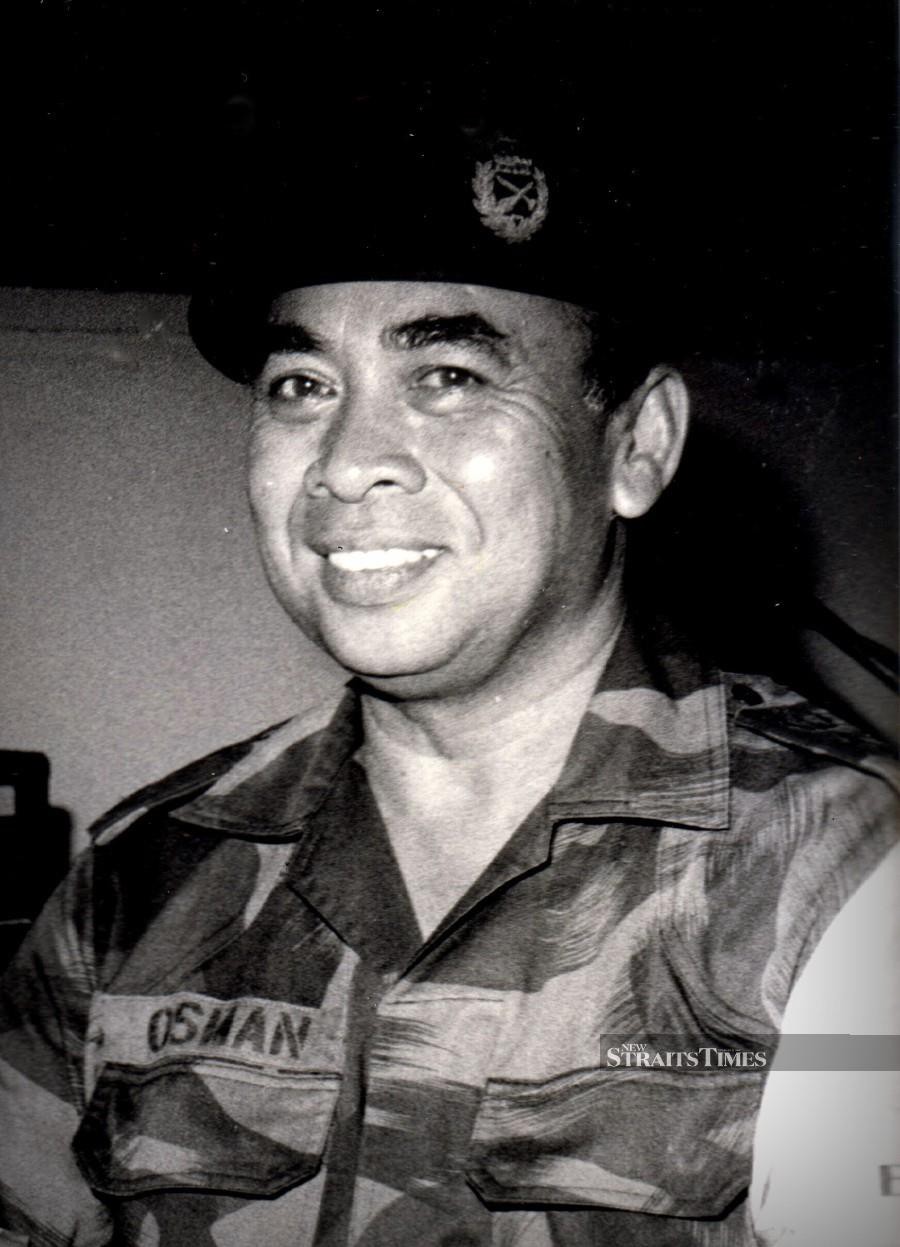
In late November 1953, the communists began their deployment around the garrison. At 5pm on March 13, 1954, they bombarded the French garrison with massive artillery and mortar fire. This was followed by assaults in two phases into the northern sector of the garrison.
They had four infantry division groups comprising 49,000 men. The final massive assault, which was carried out by new moon night on May 1, 1954, saw overwhelming human waves after waves of communist forces charging into the southern sector in tenacious attacks from their tunnels and trenches dug around the perimeter.
After six days of fighting, the communists hoisted their red flag on top of the French command bunker. The time was 5.30am, and the date, May 7, 1954. The French commander opted to surrender in order to prevent further loss of lives.
The French had 3,000 dead and 8,000 captured/wounded while the communists saw 8,000 dead and 15,000 wounded. The French prisoners were forced-marched to the prisoner of war camps in Hanoi, which was located about 470km (293 miles) away. However, almost half that number perished along the way due to diseases.
After 55 days of battle, the French Empire in Indo-China ended their 67 years of occupation. It was just arrogance, ignorance, and poor intelligence which had led to their defeat. This battle was significant for all tacticians.
At the Geneva Convention on July 21, 1954, the first Chinese Premier, Zhou Enlai, negotiated with the French Premier, Pierre Mendes, to pull out of Vietnam and forced Ho Chi Minh to agree to a partition of two states by the 17th Parallel as the De-militarised Zone (DMZ — 3 miles/4.8km either side), similar to what happened at the end of the Korean War on July 27, 1953.
Reluctantly, the communists occupied North Vietnam while the others, South Vietnam. In order to supervise this agreement, an international commission comprising Canadian, Polish and Indian members was formed under an Indian Chairman.
However, President Ho Chi Minh was dissatisfied with the agreement and was determined to unite his homeland. On Nov 1, 1955, the communists used guerrilla tactics by the Ho Chi Minh Trail, bypassing the DMZ via Laos and Cambodia.
Meanwhile, after the fall of Dien Bien Phu, profound anxiety and apprehension fell upon the Southeast Asian countries, similar to what happened in Eastern Europe which came under Russian communist rule after World War 2.
A super power propounded and expounded the Domino Theory to contain the communists from infiltrating south into Malaysia, Singapore, Indonesia and Philippines. In fact, with the French power vacuum, Laos and Cambodia came under communist rule. On Nov 1, 1955, the United States, led by President Dwight D. Eisenhower, intervened in the Vietnam War to contain communism and protect western democracy.
ROYAL ENGINEER REGIMENT

General Officer Commanding of 4 Infantry Division, Major General Datuk Osman Zain.
Following my posting from the Army Engineers School in Johore on Dec 31, 1985, I was given command of the Royal Engineer Regiment in 4 Infantry Division, Kuantan, under Major General Datuk Osman Zain.
My areas of operations were in Pahang, Terengganu and Kelantan. As a brainchild of our Prime Minister, Tun Abdul Razak Hussein, in the Security & Development concept of operations to win the hearts and minds of the people, the Five-Year Malaysia Plan development projects were introduced.
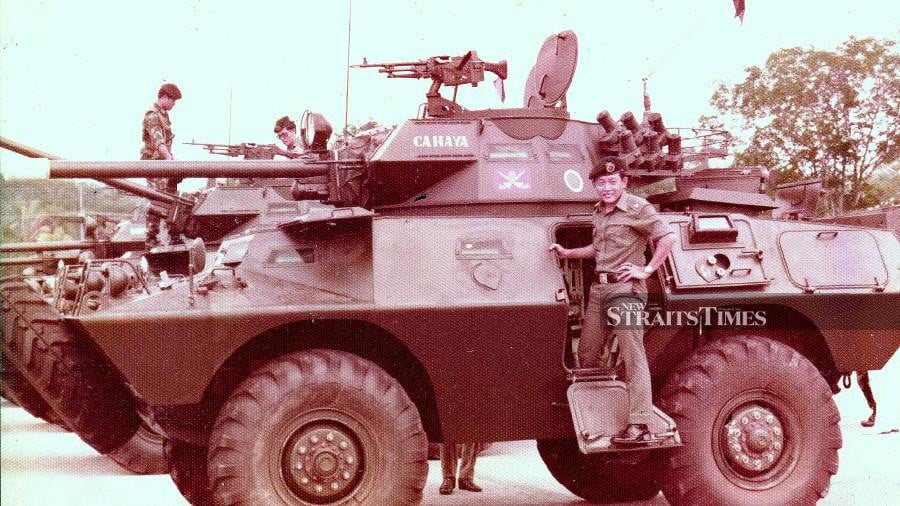
Following my posting from the Army Engineers School in Johore on Dec 31, 1985, I was given command of the Royal Engineer Regiment in 4 Infantry Division, Kuantan, under Major General Datuk Osman Zain.
My areas of operations were in Pahang, Terengganu and Kelantan. As a brainchild of our Prime Minister, Tun Abdul Razak Hussein, in the Security & Development concept of operations to win the hearts and minds of the people, the Five-Year Malaysia Plan development projects were introduced.

Preparations for patrolling the East-West Highway.
The 127km East-West Highway connecting Jeli in Kelantan to Grik in Perak was the biggest project by the Public Works Department in 1970, with security protection by our army. The purpose of this highway was also to deny access to the communist forces from crossing to and from their sanctuary at the Thai border. Our artillery guns were posted at various GTI's of the highway to provide harassing fire and bombardment against enemy activities.
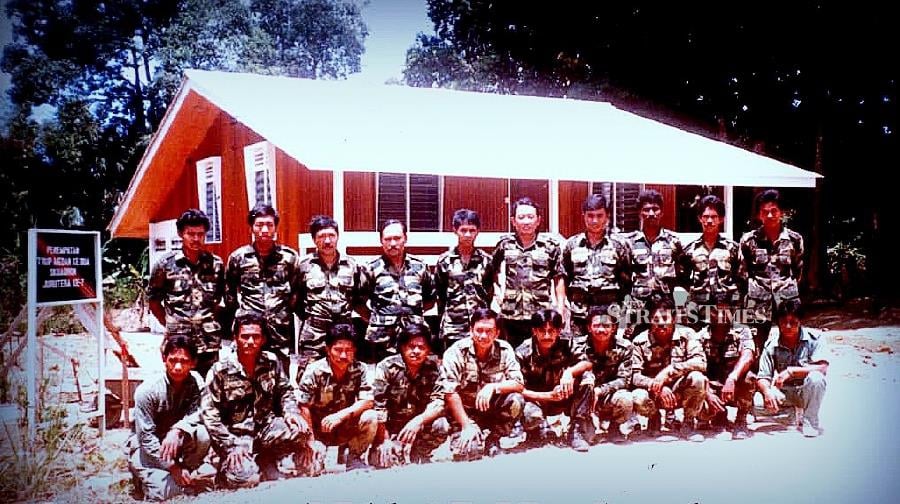
The 127km East-West Highway connecting Jeli in Kelantan to Grik in Perak was the biggest project by the Public Works Department in 1970, with security protection by our army. The purpose of this highway was also to deny access to the communist forces from crossing to and from their sanctuary at the Thai border. Our artillery guns were posted at various GTI's of the highway to provide harassing fire and bombardment against enemy activities.

Puan Zalimah's house built by Royal Engineers in March 1987.
For civic action projects, our army engineers built the 36km road from Merapoh to Gunung Tahan Park, a 6km road project at Kampung Pek in Kelantan, Puan Zalimah's house in Kota Baru (a young widow with two kids whose house was washed away by heavy flood in December 1986) and the 600-metre rifle range at Bukit Merbau.
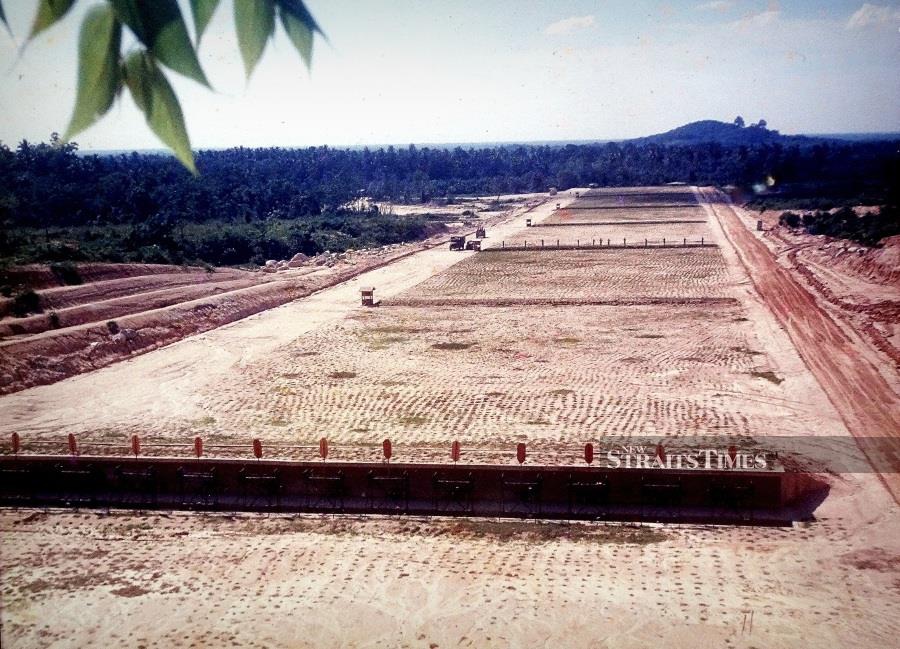
For civic action projects, our army engineers built the 36km road from Merapoh to Gunung Tahan Park, a 6km road project at Kampung Pek in Kelantan, Puan Zalimah's house in Kota Baru (a young widow with two kids whose house was washed away by heavy flood in December 1986) and the 600-metre rifle range at Bukit Merbau.

The 600 metre rifle range at Bukit Merbau.
We also provided combat engineer support for our infantry forces in the hottest area of communist insurgency in central Pahang under the command of master tactician, Brigadier General Datuk Chong Thean Bok of 4 Infantry Brigade.
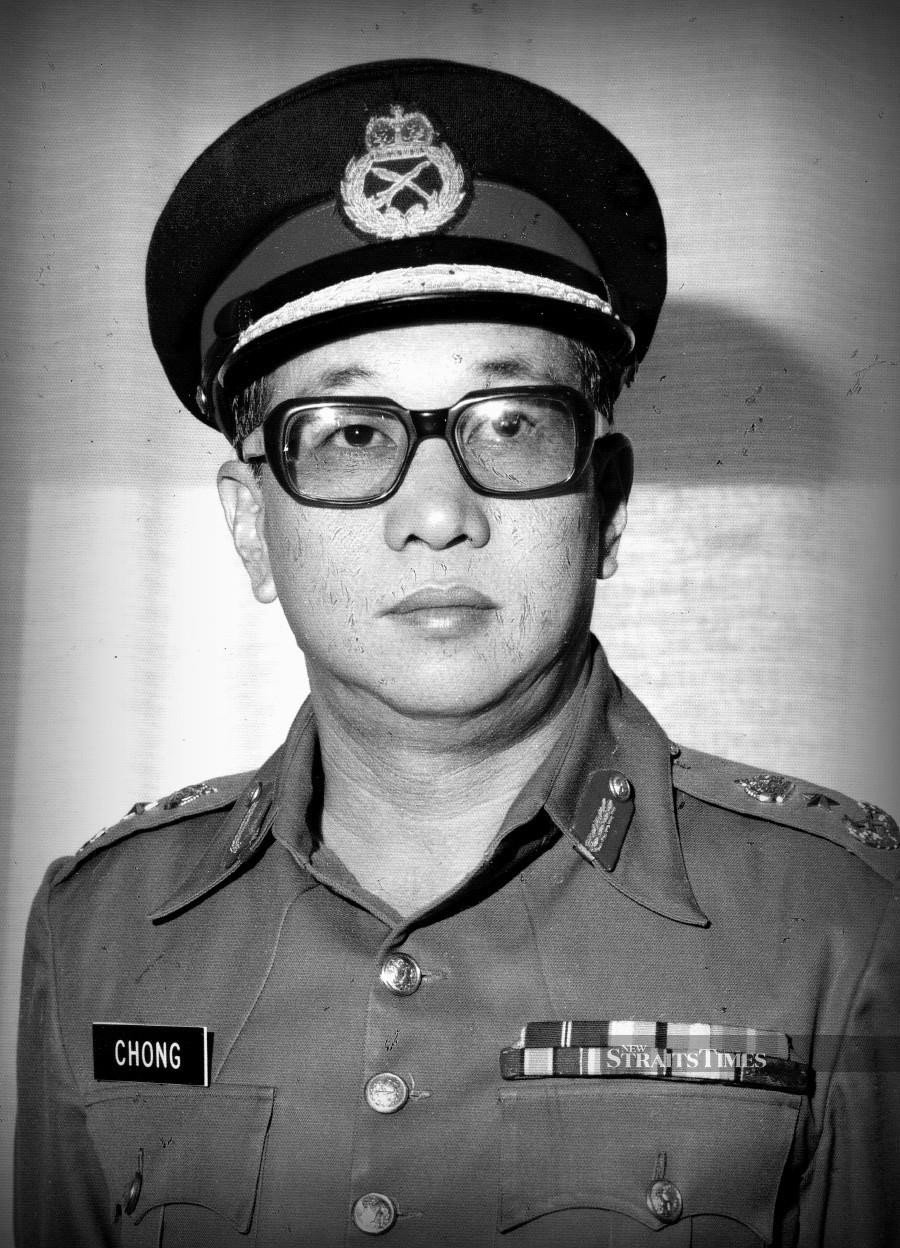
We also provided combat engineer support for our infantry forces in the hottest area of communist insurgency in central Pahang under the command of master tactician, Brigadier General Datuk Chong Thean Bok of 4 Infantry Brigade.

Brigade Commander of 4 Infantry Brigade, Brigadier General Datuk Chong Thean Bok.
Our mission was to pursue communist chief, Chong Chor of the 6th Assault Unit of MCP and to destroy the communist infrastructure, especially their food dumps. Chong Chor was eventually captured on March 2, 1988.
In the meantime, the MCP was receiving support from the communists in China. In an unprecedented historic move, our prime minister, Tun Abdul Razak Hussein, made a goodwill visit to China on May 29, 1974, as the first member of the Association of Southeast Asian Nations to forge peace in Southeast Asia in spite of their communist ideology.
Ever since then, Malaysia and China have managed to establish good diplomatic relations. Following China's open foreign policy in December 1978, President Deng Xiao Peng was instrumental in urging the MCP to seek peace with the Malaysian government in 1980.
PEACE AND FREEDOM
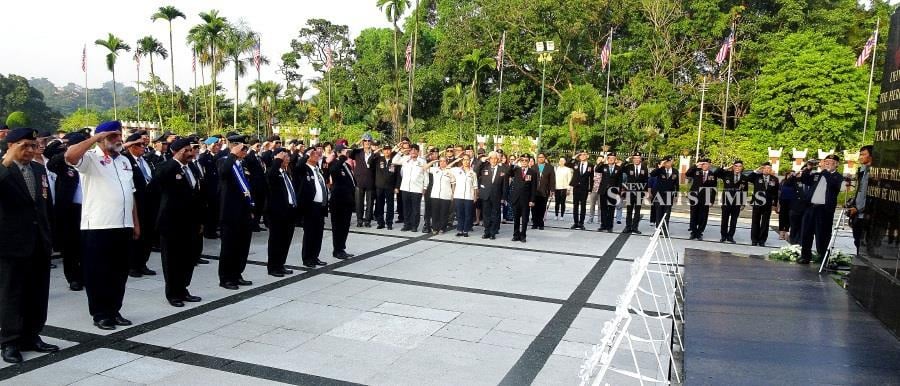
Our mission was to pursue communist chief, Chong Chor of the 6th Assault Unit of MCP and to destroy the communist infrastructure, especially their food dumps. Chong Chor was eventually captured on March 2, 1988.
In the meantime, the MCP was receiving support from the communists in China. In an unprecedented historic move, our prime minister, Tun Abdul Razak Hussein, made a goodwill visit to China on May 29, 1974, as the first member of the Association of Southeast Asian Nations to forge peace in Southeast Asia in spite of their communist ideology.
Ever since then, Malaysia and China have managed to establish good diplomatic relations. Following China's open foreign policy in December 1978, President Deng Xiao Peng was instrumental in urging the MCP to seek peace with the Malaysian government in 1980.
PEACE AND FREEDOM

“Lest We Forget” Remembrance Day at the National Monument in KL on Oct 12, 2019.
After more than 21 years, the communist insurgency came to an end when the MCP agreed to cease hostilities. On Dec 2, 1989, a peace treaty between Malaysia and the MCP was signed in Hatyai, in Southern Thailand, followed by the dissolution of the MCP and resettlement of its members on either side of the Thai border.
Meanwhile, in the East European theatre, this victorious event coincided with the collapse of communist states under Russia, most notably, the fall of the Berlin Wall in Germany on Nov 9, 1989.
Years have passed and many things may have been forgotten. How many of us are aware of the fact that our young nation has actually gone through three wars in four decades? The First Malayan Emergency in 1948-1960, the Indonesian Confrontation in 1963-1966, and the Second Malayan Emergency in 1968-1989.
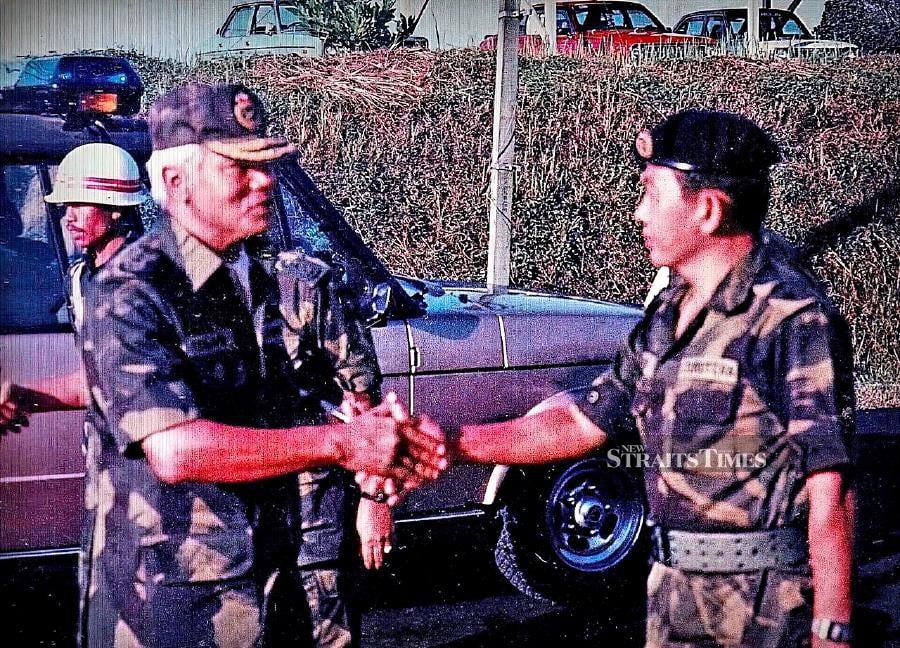
After more than 21 years, the communist insurgency came to an end when the MCP agreed to cease hostilities. On Dec 2, 1989, a peace treaty between Malaysia and the MCP was signed in Hatyai, in Southern Thailand, followed by the dissolution of the MCP and resettlement of its members on either side of the Thai border.
Meanwhile, in the East European theatre, this victorious event coincided with the collapse of communist states under Russia, most notably, the fall of the Berlin Wall in Germany on Nov 9, 1989.
Years have passed and many things may have been forgotten. How many of us are aware of the fact that our young nation has actually gone through three wars in four decades? The First Malayan Emergency in 1948-1960, the Indonesian Confrontation in 1963-1966, and the Second Malayan Emergency in 1968-1989.

Welcoming HRH the Sultan of Perak for the grand opening of the 600 metre rifle range in July 1987.
Lest we forget, we salute the defenders of our nation — the fallen heroes, the unsung heroes of our security forces, and the citizens of Malaysia. As a result, we have been able to enjoy three decades of peace and prosperity.
May our younger generation learn to appreciate these blessings of peace and freedom even as the older generation pass on to glory. May Almighty God bless Malaysia with everlasting peace and prosperity for our posterity.
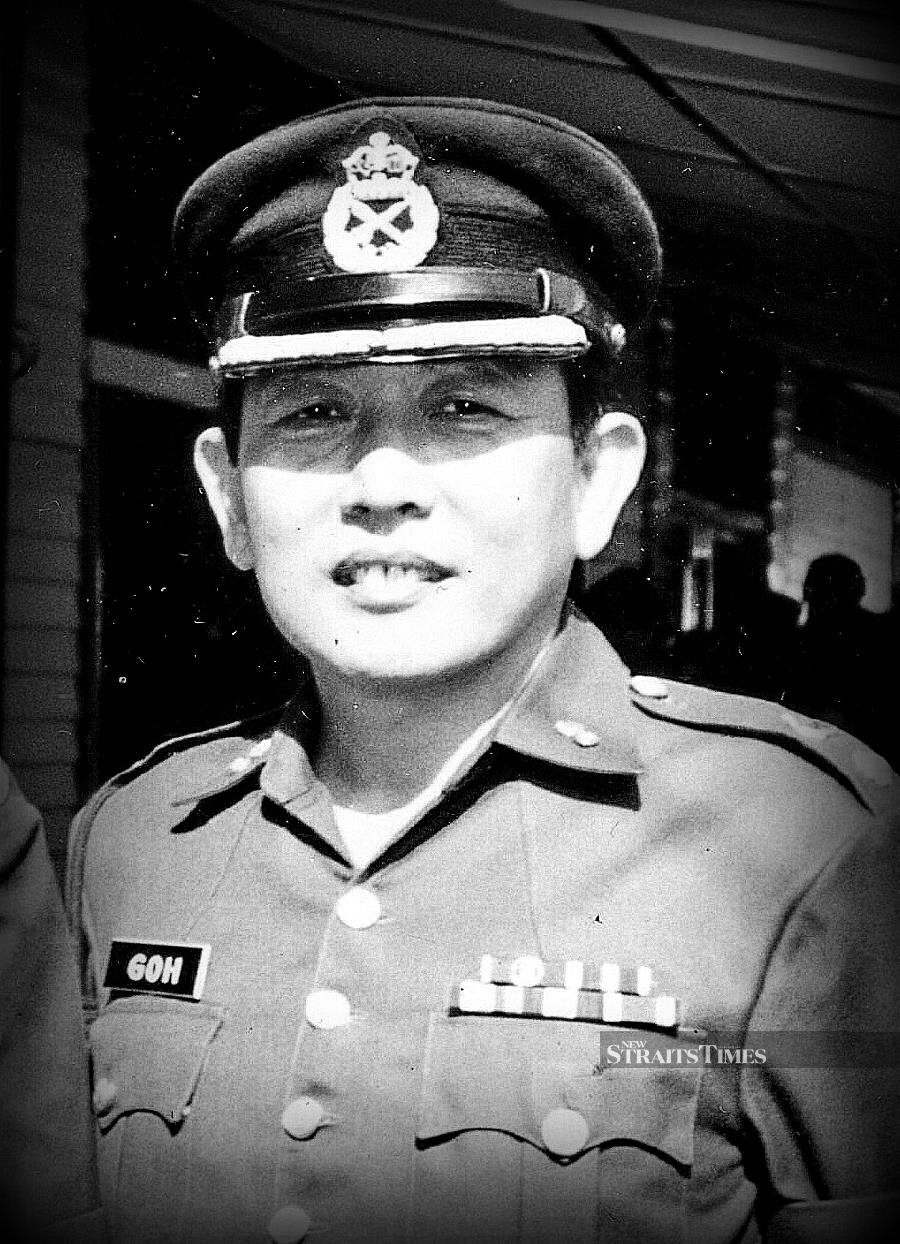
Lest we forget, we salute the defenders of our nation — the fallen heroes, the unsung heroes of our security forces, and the citizens of Malaysia. As a result, we have been able to enjoy three decades of peace and prosperity.
May our younger generation learn to appreciate these blessings of peace and freedom even as the older generation pass on to glory. May Almighty God bless Malaysia with everlasting peace and prosperity for our posterity.

Commander Royal Engineer Regiment of 4 Infantry Division, Ingenieur Lieutenant Colonel Raymond Goh.
Ingenieur Lieutenant Colonel Raymond Goh Boon Pah KMN (Royal Engineer Regiment, Retired)
1.This article is written in conjunction with the 32nd anniversary of the end of the Second Malayan Emergency on Dec 2, 1989.
2. The Battle of Vietnam was the writer's research paper in defence study during his time at the Malaysian Armed Forces Staff College in 1976. Credit to the French Embassy for some invaluable information on Indochina affairs.
Ingenieur Lieutenant Colonel Raymond Goh Boon Pah KMN (Royal Engineer Regiment, Retired)
1.This article is written in conjunction with the 32nd anniversary of the end of the Second Malayan Emergency on Dec 2, 1989.
2. The Battle of Vietnam was the writer's research paper in defence study during his time at the Malaysian Armed Forces Staff College in 1976. Credit to the French Embassy for some invaluable information on Indochina affairs.
Unfortunately, Many Malaysians now embrace Communism, and consider the CPM as the true freedom fighters.
ReplyDeleteIs communism any worst than capitalism?
DeleteU only have yr indoctrinated imagination to guide u - same as the article writer!
Reality isn't build on fraudulent thinking that's so strong-headed about its own railtracking infallibility.
While some people is so thick and whole heartedly admire the US of A likely reflect their fondest American dream deep down in their heart. In agreement with the current Chinese government system does not equate to consider the CPM as the true freedom fighters. That's just too "Junior G. Bush--y"! - if you are not with us, you are with them? So blind that they can't see, that the Democracy and Communism of the old are not exactly the same as the current Democracy and Communism!
ReplyDelete